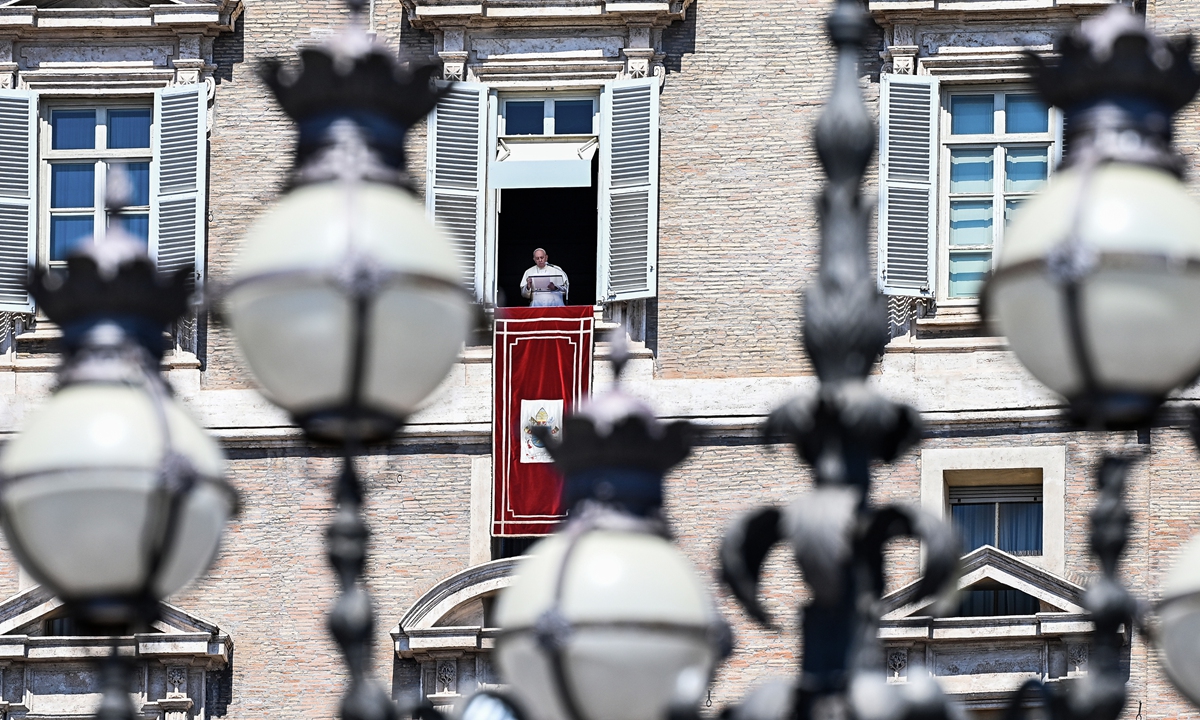China-Vatican deal could further 'ease ties'
By Zhao Yusha and Shan Jie Source: Global Times Published: 2020/9/24 20:34:24

Pope Francis addresses worshippers from the window of the apostolic palace overlooking St. Peter's Square in The Vatican on Sunday, 2020 during the weekly Angelus prayer, amid the COVID-19 pandemic caused by the novel coronavirus. Photo: AFP
The renewal of an agreement between China and the Vatican on the appointment of bishops will contribute to the development of Chinese Catholic churches, and signal to the world that China's Catholic churches could continue healthy development under the agreement, according to religious practitioners and experts.
They believe that US interference can hardly sway the Vatican on the deal, although Washington has tried to weigh in the bilateral agreement and loudly criticized China's Catholic churches.
A source from the Vatican confirmed to the Global Times previously that China and the Vatican have been seeking to renew the deal, which was signed on September 22, 2018 and expires next month. No official information about the renewal has been released.
AFP reported on Tuesday that Pope Francis has given the go-ahead for the renewal of the agreement, which is still in a trial mode, for two years.
The Holy See Press Office did not respond to the Global Times' inquiry as of press time. Vatican watchers and China's Catholic bishops are confident about the signing.
"The agreement should be basically a simple extension of the old one," Vatican affairs expert Francesco Sisci told the Global Times on Thursday, noting that the issue is whether it will be renewed for one year or two.
Asked whether China and the Vatican had extended the agreement on the appointment of bishops, Wang Wenbin, spokesperson of China's Ministry of Foreign Affairs, said on Wednesday that there is good communication between the two sides. China holds a sincere and positive attitude toward advancing relations with the Vatican.
With renewal of the deal as yet unannounced, US Secretary of State Mike Pompeo entered the picture by writing an article in the US religious magazine First Things, slamming the "horrific treatment" of believers of all faiths in China.
"The Vatican endangers its moral authority, should it renew the deal," he added on Twitter.
The Vatican did not publicly respond to Pompeo's tweet or article.
"If the Holy See made such a comment about US relations with a state, I can't imagine Secretary Pompeo would be happy," a former Vatican official, not authorized to speak on the record, told Catholic News Service on Monday.
Pompeo's accusation was then condemned by Chinese bishops.
Chinese Catholic churches have been strictly following the terms of the agreement in the past two years. For example, the churches have been devoted to choosing bishops for places where the position was vacant. People in Catholic churches are very satisfied, said Zhan Silu, vice chairman of the Bishops' Conference of the Catholic Church in China and bishop of the diocese of Mindong, East China's Fujian Province.
If the deal is renewed, it will serve as another proof that the bilateral relations between China and the Vatican are heading down a positive road, and it will send a positive signal that people in China's Catholic churches are seeking the healthy development of the church, said Zhan.
Zhan said that any wise person would think independently, and would not put some Western politicians' preference above the Church's interest.
On a positive note, Pompeo's interest in the China-Vatican agreement proves to the world that the agreement has global paramount importance. It is not just about the lives of a few million Catholics in China, said Sisci, noting that the Vatican proves to be de facto the crossroads of international politics and of global dialogue on China and with China.
Despite growing controversies between China and the US, the Vatican has carried on its important dialogue with China. This is evidence that the Holy See could be a reliable partner and of importance for China, he said.
RELATED ARTICLES:
Posted in: DIPLOMACY